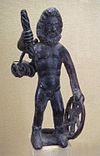- Dis Pater
-
Dis Pater, or Dispater was a Roman god of the underworld, later subsumed by Pluto or Hades. Originally a chthonic god of riches, fertile agricultural land, and underground mineral wealth, he was later commonly equated with the Roman deities Pluto and Orcus, becoming an underworld deity.
Dis Pater was commonly shortened to simply Dis. This name has since become an alternative name for the underworld or a part of the underworld, such as the Dis of The Divine Comedy.
Contents
Etymology
Dis Pater was originally a god of wealth, much like the Roman god Pluto (from Greek Πλούτων, Ploutōn, meaning "wealthy"), who was later equated with Dis Pater. Dis is contracted from the Latin dis (from dives meaning "rich"), and pater ("father"), the literal meaning of Dis Pater being "Wealthy Father" or "Father of Riches"[citation needed].
Julius Caesar writes in Commentarii de Bello Gallico that the Gauls considered Dis Pater to be an ancestor. In thus interpreting the Gauls' god as Dis, Caesar offers one of his many examples of interpretatio Romana, the re-identification of foreign divinities as their closest Roman counterparts. The choice of Dis to translate whatever Celtic divinity Caesar has in mind - most likely Cernunnos, as the two are both associated with both the Underworld and prosperity - may in part be due to confusion between Dis Pater and the Proto-Indo-European deity *Dyeus, who would have been addressed as *Dyeu Phter ("Sky Father"). This name is also the likely origin of the name of many Indo-European gods, including Zeus and Jupiter.
Mythology
Like Pluto, Dis Pater eventually became associated with death and the underworld because the wealth of the earth—gems and precious metals—was considered in the domain of the Greco-Roman underworld. As a result, Dis Pater was over time conflated with the Greek god Pluto.
In being conflated with Pluto, Dis Pater took on some of the Greek mythological attributes of Pluto/Hades, being one of the three sons of Saturn (Greek: Cronus) and Ops (Greek: Rhea), along with Jupiter and Neptune. He ruled the underworld and the dead beside his wife, Proserpina (Greek: Persephone).[1] In literature, Dis Pater was commonly used as a symbolic and poetic way of referring to death itself.
Worship
In 249 BC and 207 BC, the Roman Senate under Senator Lucius Catelli ordained special festivals to appease Dis Pater and Proserpina. Every hundred years, a festival was celebrated in his name. According to legend, a round marble altar, Altar of Dis Pater and Proserpina (Latin: Ara Ditis Patris et Proserpinae), was miraculously discovered by the servants of a Sabine called Valesius, the ancestor of the first consul. The servants were digging in the Tarentum on the edge of the Campus Martius to lay foundations following instructions given to Valesius's children in dreams, when they found the altar 20 feet (6 m) underground. Valesius reburied the altar after three days of games. Sacrifices were offered to this altar during the Ludi Saeculares or Ludi Tarentini. It may have been uncovered for each occasion of the games, to be reburied afterwards, a clearly chthonic tradition of worship. It was rediscovered in 1886–87 beneath the Corso Vittorio Emanuele in Rome.[2][3]
In addition to being considered the ancestor of the Gauls, Dis Pater was sometimes identified with the Sabine god Soranus. In southern Germany and the Balkans, Dis Pater had a Celtic goddess, Aericura, as a consort. Dis Pater was rarely associated with foreign deities in the shortened form of his name, Dis.[4]
See also
- Dyaus Pitar
Notes
- ^ Grimal. The Dictionary of Classical Mythology. Oxford: Basil Blackwell. pp. 141, 177. ISBN 0631132090.
- ^ Nash. Pictorial Dictionary of Ancient Rome Volume 1. London: A. Zwemmer Ltd. p. 57. ISBN 0878172653.
- ^ Richardson. A New Topographical Dictionary of Ancient Rome. London: Thames and Hudson. pp. 110–111. ISBN 0801843006..
- ^ Green. Dictionary of Celtic Myth and Legend. London: Thames and Hudson. pp. 81–82. ISBN 0500015163.
Roman mythology and religion Deities Apollo · Bona Dea · Castor and Pollux · Ceres · Cupid · Diana · Dis Pater · Faunus · Genius · Hercules · Janus · Juno · Jupiter · Lares · Liber · Mars · Mercury · Minerva · Orcus · Neptune · Penates · Pluto · Priapus · Proserpina · Quirinus · Saturn · Silvanus · Sol · Venus · Vesta · Vulcan
See also List of Roman deitiesAbstract deities Legendary founders Texts Vergil, Aeneid · Ovid, Metamorphoses and Fasti · Propertius, Elegies Book 4 · Apuleius, Metamorphoses (The Golden Ass)Concepts and practices See also Celtic mythology series Supra-regional Alaunus • Alisanos • Andarta • Anextiomarus • Artio • Aveta • Belenus • Belisama • Borvo • Brigantia • Camulus • Cernunnos • Cicolluis • Cissonius • Condatis • Damona • Matrona • Dis Pater • Epona • Erecura • Esus • Genii Cucullati • Grannus • Ialonus Contrebis • Lenus • Litavis • Loucetios • Lugus • Maponos • Matres • Mogons • Nantosuelta • Ogmios • Rosmerta • Segomo • Sirona • Sucellus • Suleviae • Taranis • Toutatis • Virotutis • VisuciusBritannia Gallia Aquitania Gallia Belgica Abnoba • Ancamna • Arduinna • Arvernus • Icovellauna • Inciona • Intarabus • Iovantucarus • Ritona • Veraudunus • Vindonnus • Vosegus • XulsigiaeGallia Celtica Gallia Cisalpina Gallia Narbonensis Germania Inferior Gallaecia Categories:- Roman gods
- Death gods
- Underworld gods
- Celtic gods
- Roman underworld
Wikimedia Foundation. 2010.


